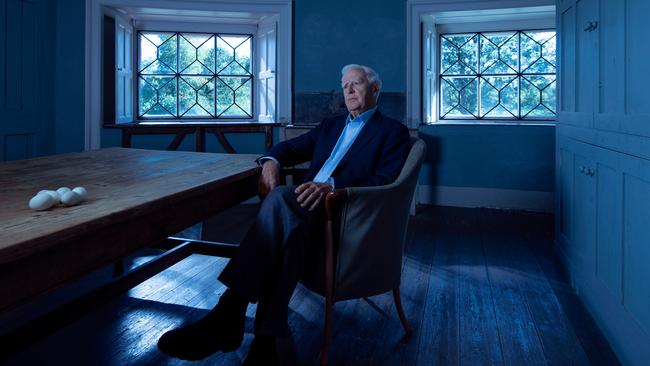John le Carre’s spy truths exposed in new Apple TV+ documentary
This documentary shows how intelligence officer turned author John le Carré perfected the art of hiding in full view

The Pigeon Tunnel is the latest film from Oscar-winning documentarian Errol Morris, who was responsible for changing the nature of factual filmmaking in the way he developed new techniques and flourishes previously disdained by traditional documentary filmmakers.
His use of highly filmic, stylised re-enactments and originally composed music, reimagined documentary cinema aesthetics, and films such as The Thin Blue Line expunged the border between art and activism. His idea was to construct a perception of reality rather than simply capture it in the cinema verite sense, adopting any style he believes does not magically generate truth.
The subject of this fascinating film is the master of espionage fiction, David Cornwell, better known to readers as John le Carré, who, a one-time intelligence officer himself, raised the spy novel to a new level of significance and regard. He was admired by literary figures such as Graham Greene, Philip Roth, and Ian McEwan, who once called him “the most significant novelist of the second half of the 20th century in Britain”.
Le Carre wrote bestselling novels like The Spy Who Came In From The Cold and Tinker Tailor Soldier Spy, which inspired a school of British spy novelists like Len Deighton and Adam Hall who developed their own intricate version of decadence, treachery, and betrayal within the secret establishment. Le Carre’s secret agents, some decent and well-meaning, were betrayed and compromised by incompetence and bureaucratic rivalry at the top levels. Forced into moral compromises, they erode the very ideals of patriotism that had first made them spies.
The idea that he was a genre novelist always needled him and, it was noted in The Guardian, fed his notoriously adversarial post-fatwa response to Salman Rushdie. (“Would the same people have leapt to the defence of a Ludlum or an Archer?”)
Morris produced the film, alongside two of Cornwell’s sons, Simon and Stephen from their production company the Ink Factory, which co-produced the film, overseeing a crew of more than 100, large for a documentary. The Cornwell sons are themselves highly successful and engaged filmmakers.
For Cornwell, the conversation with Morris was imagined as “a definitive swan song,” they say in a production statement. “David knew already that it would be his last significant interview, his chance to put his ultimate persona on the record.”
Cornwell, who describes the experience of the interview as talking as if “to a friend across the fire” is clear as to its objective. “I saw this opportunity at my great age as something definitive,” he says. Cornwell, who died in 2020, often spoke glowingly of Morris, his sons say, and the filmmaker’s penetrating interviews, and wanted to make a kind of final confession — “a last opportunity to sculpt his image and leave a reflective legacy that was every bit as carefully constructed as his fiction.”
And Morris attempts to go behind the pseudonym of a man who, as his biographer Adam Sisman says, had hidden in plain sight, perfecting the art of hiding in full view. His had been a life in which its narrative had beguilingly intertwined fact and fiction. “One suspects that le Carre enjoys teasing his readers, like a fan dancer, offering tantalising glimpse, but never clear view of the figure beneath,” Sisman wrote.
Morris draws on Cornwell’s New York Times bestselling 2016 memoir The Pigeon Tunnel: Stories from My Life, setting his portrait of the enigmatic icon to an original score by Philip Glass, in collaboration with Paul Leonard-Morgan. It’s the title Cornwell says that has been the putative one at some stage for all his books.
It refers to the way his conman father, Ronnie, also a serial bankrupt violent philanderer and fantasist, took him as a child to a Monte Carlo resort where shotgun-holding rich men would shoot pigeons from the sky over the Mediterranean Sea. They were captive-bred birds living on the roof, then forced through a tunnel to fly off, when they would be summarily shot by the gentlemen awaiting them.
A terrible rigged game, like so many of the encounters in his books, a con his father loved and a kind of metaphor for spying itself, his characters so often fail at a game at which they think they are winning. Morris vividly features the image throughout his film: beautiful, horrifying and tragic. “The pigeon tunnel is endlessly suggestive,” says Morris. “This endless repetition, until you die. Whether you’re OK with it or not, maybe it’s just the way it is.”
The film was shot at Wrotham Estate, a neo-Palladian country house in North London, with four and sometimes five cameras. The image of Cornwell often is broken into shards, and is suggestive perhaps of the enigmatic nature of the man, or the phantasmagoric life he knew as a child. There’s archival footage, grabs of other interviews, the dramatised Morris-style vignettes, craftily abstracted, interesting shots of Cornwell’s working drafts complete with crossings-out and rewrites, and the novelist himself in voice-over reading from his books.
And the close-ups of Cornwell are shot on Morris’s invention called the Interrotron, his variation on the teleprompter. It allows him to film the unsettling, revealing and startlingly personal interviews that have made him such a significant documentarian. Instead of the person being interviewed seeing text across the camera lens, they see the face of the person asking questions.
Le Carre speaks with absorbing fluency and charm. He rarely is lost for a word. A master of understatement and studied evasiveness, there is something of the university don about him, and he still is handsomely charismatic in his late eighties. A reflective and slightly chastened figure, his delivery is largely deadpan. A deep sense of irony underlies most of his utterances. His hands often are in motion illustrating his remarks. His laugh is largely absent.
But then, too, there are sudden moments of joy and pleasure. And his laugh, when it does come is full throated, along with his obvious delight in doing the voices of characters about whom he speaks. Morris is mostly absent in the film, though is heard towards the end asking several questions. He says he tries not to direct his interviews, employing the “Shut the f--k up” technique of interaction with his subjects, “allowing something to just emerge”. And it does from Cornwell, who speaks almost as if he is a character from one of his novels.
Like Le Carre’s novels, this interview, filmed over many hours, going from childhood to the present, is, as becomes clear in the novelist’s sometimes intimate remembrance, a memoir with many layers.
It’s a personal journey through time, an examination of his own work and significance, though told in self-deprecating terms, and a privileged look at the nature of writing itself.
“My business has been to try to make credible fables out of the worlds I visited or visited me,” he says. “The journey for me has been one of imagination – the imaginative refuge from reality, the recreation of chaos, not in an orderly way but in a comprehensibly individualised way that makes people feel not as a la James Bond I wish-this-was-me, but Jesus I hope this isn’t true.” Morris asks the great spy novelist about his upbringing and the influence of his conman father, Ronnie, and how they inspired his work, and especially about the great themes of duplicity, deception, and moral choices. (“Whether he believed in God is mysterious, but he was certain God believed in him”, he says of Ronnie, who taught him early “that there is no centre to a human being.”) As well as, of course, questions about the shifting ambiguities and cynical manipulation of spying.
The spy, he says, indulged in “the joy of self-imposed schizophrenia,” he says. “The secret agent loves the duality all the time of being the opposite to your outward self, the joy is voluptuous, a sensual journey of constantly your luck and surviving.”
Cornwell’s now well-documented amorous proclivities are avoided, which seems odd in the light of Suleika Dawson’s recent salacious memoir of their extramarital liaisons. “I’m not going to talk about my sex life, any more than you would,” he says. “It seems, I trust, to be an intensely private matter. My love life has been a very difficult passage as you would imagine but it’s resolved itself wonderfully.” He pauses. “And that’s enough of that subject.”
This beautifully constructed film finishes with Morris asking one last question. What does the spy novelist see these days when he looks in the mirror. “Now, today, I’m much more at ease with myself in age, more reconciled to who I was and who I was not when I look in the mirror,” he says. “Unless I’ve got a dreadful hangover.”
The Pigeon Tunnel streaming on Apple TV+.




To join the conversation, please log in. Don't have an account? Register
Join the conversation, you are commenting as Logout